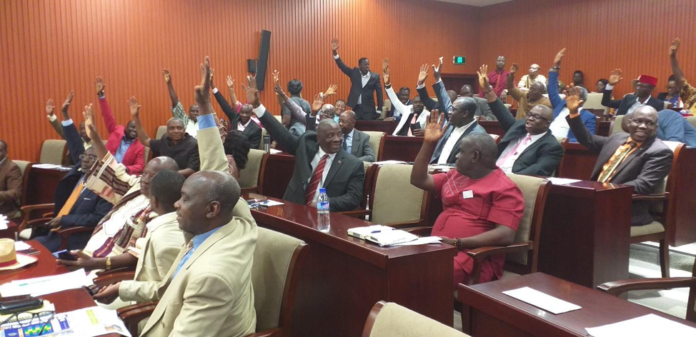At long last, the House of Representatives has approved the national budget for fiscal year 2020/2021 amounting to US$570.1 million at an exchange rate of L$199 to US$1.
The House’s version was increased by US$34.6 million as compared to the draft budget as submitted by President George Weah in the amount of US$535.4 million in July of this year.
The budget amount is expected to be raised from the following sources:
Africa Development Bank: US$14million
Liberia Business Registry: US$1,500,000
Liberia Immigration Services: US$1,019,000
Liberia Petroleum and Refinery Company: US$750,000
Liberia Telecommunications Authority: US$1,356,000
Ministry of Foreign Affairs: US$206,000
Ministry of Transport: US$2,028,000
National Aquaculture and Fishery Authority: US$1,100,000
National Road fund/ LPRC: US$1,700,000
Tax Revenue (New Excise Policy) US$11,000,000
The fiscal envelope, as passed by the House also amounts to an 8.3 percent increase of last year’s budget of US$526 million.
A motion to pass the budget was proffered by Rep. Dixon Seboe (District #16, Montserrado County) deriving from recommendations of the Joint Committee on Ways, Means, Finance, and Public Accounts and Expenditure.
According to the Committee, the amount of US$34.6 million was discovered as additional revenue, accounting for road fund arrears, contributions from State owned Enterprises (SOEs), additional revenue from domestic taxes and fees, and grant from the African Development Bank (ADB).
In seeking Plenary’s approval for the passage of the resource envelope, the Joint Committee said: “… we once again crave your indulgence to approve this Fiscal Year 2020/2021 National Budget in the amount of US$570,111,173.00 (in words: FIVE HUNDRED SEVENTY MILLION, ONE HUNDRED ELEVEN THOUSAND ONE HUNDRED SEVENTY-THREE UNITED STATES DOLLARS) or its equivalent of L$113,452,123,427.00 (in word: ONE HUNDRED THIRTEEN BILLION FOUR HUNDRED FIFTY TWO MILLION ONE HUNDRED TWENTY-THREE THOUSAND FOUR HUNDRED TWENTY SEVEN LIBERIAN DOLLARS) with compensation at US$291,879,404.00 and no more.”
Classification of the budget
Out of the approved fiscal envelope, the biggest portion goes to the Public Administration sector with appropriation of US$207,852,695, Security and Rule of Law follows with US$80,043,986, while Education comes next in line at US$79,239,293 and Health takes US$70,562,369.
The recommended appropriation for Infrastructure and Basic Service sector is US$39,439,584, Municipal Government- US$27,587,800, Transparency and Accountability- US$26,168,621; energy an environment sector, US$13,270,606, Social Development gets US$12,030,282, and Industry and Commerce- US$7,540,523.
Budget in summary
For the economic classification, Compensation of Employees obviously takes the largest appropriated amount of US$291,879,404, Use of Goods and Services, US$75,182,386; US$64,135,225 for Domestic Liabilities, Non-financial Assets takes US$60,966,381; while US$46,452,974 recommended for Grants.
Others include Foreign Liabilities, US$28,764,775, Social Benefits US$2,042,028 and US$688,000 budgeted for Subsidy.
Meanwhile, the House also endorsed several fiscal measures outlined by the Joint Committee in its report. The committee, among other things, called for budgetary appropriation for the Liberia Revenue Authority to be paid immediately upon collection of revenue by the budgetary ratio 5% of revenue collection until its budgetary ceiling is realized in accordance with the Act creating the Liberia Revenue Authority.
It also requested that all social development funds including the Land Rental Fees be transferred directly to the effected county’s escrowed accounts, while revenue sharing ratio between the Liberia Telecommunications Authority and the Government of Liberia should be 40%:60% respectively.
Members of the House of Representatives have been in an extended session since last week which expired this weekend.
The budget has now been forwarded to the Senate for concurrence, and when approved, will be sent to the President for signature.























Comments are closed.